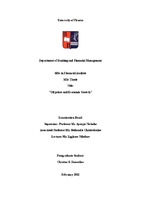Oil prices and economic growth

Προβολή/
Θεματική επικεφαλίδα
Πετρέλαιο -- Βιομηχανία και εμπόριο -- Οικονομικές απόψεις ; Petroleum products -- PricesΠερίληψη
In the wake of Arab world crisis that already causes oil supply disruptions and oil price increases, the present dissertation records and sheds light to the main historical oil prices shocks from the 1970s till nowadays and the main determinants of oil prices and economic growth. With the ultimate purpose being the examination of the much debated effect of oil price on the economic growth, we test and analyze the existence and the type -bidirectional or unidirectional, short-term or long-term- of this relation and the degree of influence for the main industrialized G7 countries (the USA, the UK, Italy, France, Germany, Japan and Canada) during the 1990-2007 period (quarterly basis data). The Augmented Dickey Fuller Unit Root Test is used in order to prove if the time series variables (GDP and oil prices) are stationary or non- stationary, the Johansen approach is used for tracing or not cointergration, the Error Correction Model (VEC) in case of cointegration existence while on the occasion that no cointergration is proved, we use Granger Causality test. The empirical results mainly suggest the existence of a relation- albeit different but with some common characteristics across the G7 countries. In all countries except for Canada, there is cointegration between oil prices and GDP in the long-term. In all countries except for Canada there is bidirectional relation in the long-term. In Germany, France, Italy and Japan the relation between oil prices and GDP is negative. In Germany the relation is unidirectional in the short-term where the oil prices affect the GDP. In the UK and in Japan there is unidirectional relation in the short-term where the GDP affects oil prices. In Canada, the UK and in the USA the relation is shown positive. In the case of Canada there is unidirectional relation where the GDP influences oil prices.


